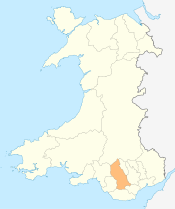Abercwmboi
Abercwmboi is a village in the Welsh county borough of Rhondda Cynon Taf in Wales, United Kingdom.
Abercwmboi
| |
|---|---|
 Park View Terrace, Abercwmboi | |
 Abercwmboi Location within Rhondda Cynon Taf | |
| Principal area | |
| Ceremonial county | |
| Country | Wales |
| Sovereign state | United Kingdom |
| Police | South Wales |
| Fire | South Wales |
| Ambulance | Welsh |
| UK Parliament | |
Location
Abercwmboi is one of the last remaining villages in the Cynon Valley. It has retained its identity and not been developed as have many other Cynon Valley villages. As a result, is a close and friendly community.
The village lies on the B4275 Cardiff Road - the old main route to Cardiff before the A4059 road was built - between Aberdare and Mountain Ash. It is the most south-easterly named settlement that, for postal reasons, is included in the town of Aberdare.
Name
Abercwmboi - earlier Abercynfoi, translated: 'mouth of the Cynfoi'. Cynfoi is the name of the stream. Aberconfoi Ycha/Issa 1570 were farms named after the stream that enters the Cynon river there.
Before 1905 the village was named Capcoch (red cap). The primary school and local pub / inn still have the name. The remains of the original Cap Coch Inn, can be found on the mountainside, above the village. The first streets to be built in Cap Coch were, John Street, Jenkin Street, Mary Street, Margaret Street, Richard Street and William Street. The beginning of Park view terrace near to the school, was also built near this time. The village boasted two main chapels, both of which carried out their services through the medium of Welsh - Bethlehem and Bethesda Chapels, of John Street.[1]
History
.jpg)

Abercwmboi Workmen's Hall (paid for out of the miners' contributions) has been the base for many trips and events, with the miners taking their families on day trips, as a community. The hall has also been used as a cinema and a public house over the years.
A yearly village carnival was held in the village. Every street would work on a 'float' and a theme. Then these floats would parade around the village and fete would follow in the local school. The winning float would then join the Aberdare carnival in the summer, and hope to win that parade. This tradition stopped in the 1980s.
Abercwmboi and the closure of its Phurnacite factory feature in the book Among Others by Jo Walton
There were large lakes near to the village which used to boast swans, etc. Lord Aberdare would ride around these lakes and catch swans, ducks, etc. Much of these lakes have since been removed. The largest was filled in by the 'Macleans tip', and factories have since been built upon this area - Showa, etc.
Remains of the Abercwmboi colliery can still be seen on the mountainside above Bronallt Terrace and close to 'Peggy Pit's' house.
Back in the 1940s the village boasted over 40 shops throughout the village, from Mr. Tom Jones' shop, to the Co-op, to Beynons shop etc. 'Parry's Bakery' was a famous bakery, found in Bronallt Terrace and was visited by hundreds of people from all over the Cynon Valley and beyond.
The original Cap Coch primary school had to be demolished (1980-81) and a new school built on the site (after much campaigning by the mothers of the village). The old school's yard fell into a mine shaft and made the area unstable. The children as a result, had to travel by bus each day to attend the Aman school. The mothers of the village fought long and hard, and travelled to the Welsh Office in Cardiff, to have the school rebuilt, and for the area to be made safe.
There are still many remains of Abercwmboi's industrial past. The levels behind Park view Terrace and the remains of the colliery behind Bronallt Terrace. The 'Brick works' in Aberaman (old Aldi site), would have employed many from the village, too. Pipes and bricks were made there. Also the Phurnacite lands are still evidence of the past of the village. This has since become a haven for wildlife in the area.
Abercwmboi was also called 'Little Moscow' by many local people in the valleys during the 1920s miners' strike. Abercwmboi was hit badly, economically at this time and many of the miners left to look for work elsewhere. There was much fighting, etc., and the police and army were called in to help control the miners in Abercwmboi at this time.[2]
Many people from the village were also involved in the choir conducted by 'Caradog' (the statue of him can be seen in Aberdare town centre). Many people went to London to the Crystal Palace with him and won major competitions.
The village was mostly Welsh speaking until the 1900s. A Welsh language Baptist chapel, Bethesda remains open in 2016. The 1891 census shows that nearly all residents of the oldest streets John Street and Jenkin Street, were first-language Welsh speakers.
Recently, there have been many Iron Age finds in the Abercwmboi area, proving the area has been inhabited for thousands of years.
Although for postal reasons the village comes under the town of Aberdare, its telephone std code is 01443, the code for Pontypridd Exchange, not Aberdare's 01685.
It is at the southern end of Aberdare Parish, therefore is a part of Aberdare.
References
- Rhondda Cynon Taf Heritage Trail Archived July 17, 2011, at the Wayback Machine
- BBC Coal House
